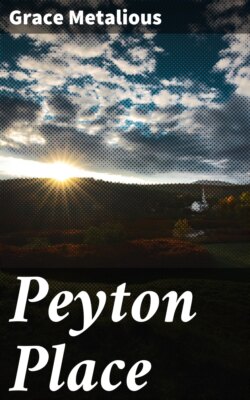Читать книгу Peyton Place - Grace Metalious - Страница 4
На сайте Литреса книга снята с продажи.
♦ 1 ♦
ОглавлениеTable of Contents
Indian summer is like a woman. Ripe, hotly passionate, but fickle, she comes and goes as she pleases so that one is never sure whether she will come at all, nor for how long she will stay. In northern New England, Indian summer puts up a scarlet-tipped hand to hold winter back for a little while. She brings with her the time of the last warm spell, an unchartered season which lives until Winter moves in with its backbone of ice and accoutrements of leafless trees and hard frozen ground. Those grown old, who have had the youth bled from them by the jagged edged winds of winter, know sorrowfully that Indian summer is a sham to be met with hard-eyed cynicism. But the young wait anxiously, scanning the chill autumn skies for a sign of her coming. And sometimes the old, against all the warnings of better judgment, wait with the young and hopeful, their tired, winter eyes turned heavenward to seek the first traces of a false softening.
One year, early in October, Indian summer came to a town called Peyton Place. Like a laughing, lovely woman Indian summer came and spread herself over the countryside and made everything hurtfully beautiful to the eye.
The sky was low, of a solidly unbroken blue. The maples and oaks and ashes, all dark red and brown and yellow, preened themselves in the unseasonably hot light, under the Indian summer sun. The conifers stood like disapproving old men on all the hills around Peyton Place and gave off a greenish yellow light. On the roads and sidewalks of the town there were fallen leaves which made such a gay crackling when stepped upon and sent up such a sweet scent when crushed that it was only the very old who walked over them and thought of death and decay.
The town lay still in the Indian summer sun. On Elm Street, the main thoroughfare, nothing moved. The shopkeepers, who had rolled protective canvas awnings down over their front windows, took the lack of trade philosophically and retired to the back rooms of their stores where they alternately dozed, glanced at the Peyton Place Times and listened to the broadcast of a baseball game.
To the east on Elm Street, beyond the six blocks occupied by the business section of the town, rose the steeple of the Congregational church. The pointed structure pierced through the leaves of the surrounding trees and shone, dazzlingly white, against the blue sky. At the opposite end of the business district stood another steepled structure. This was St. Joseph’s Catholic Church, and its spire far outshone that of the Congregationalists, for it was topped with a cross of gold.
Seth Buswell, the owner and editor of the Peyton Place Times, had once written, rather poetically, that the two churches bracketed and held the town like a pair of gigantic book ends, an observation which had set off a series of minor explosions in Peyton Place. There were few Catholics in town who cared to be associated in any partnership with the Protestants, while the Congregationalists had as little desire to be paired off with the Papists. If imaginary book ends were to exist in Peyton Place they would both have to be of the same religious denomination.
Seth had laughed at the arguments heard all over town that week, and in his next edition he reclassified the two churches as tall, protective mountains guarding the peaceful business valley. Both Catholics and Protestants scanned this second article carefully for a trace of sarcasm or facetiousness, but in the end everyone had taken the story at its face value and Seth laughed harder than before.
Dr. Matthew Swain, Seth’s best friend and oldest crony, grunted, “Mountains, eh? More like a pair of goddamned volcanoes.”
“Both of ’em breathin’ brimstone and fire,” Seth added, still laughing as he poured two more drinks.
But the doctor would not laugh with his friend. There were three things which he hated in this world, he said often and angrily: death, venereal disease and organized religion.
“In that order,” the doctor always amended. “And the story, clean or otherwise, that can make me laugh at one of these has never been thought up.”
But on this hot October afternoon Seth was not thinking of opposing religious factions or, for that matter, of anything in particular. He sat at his desk behind the plate glass window of his street floor office, sipping at a cold drink and listened desultorily to the baseball game.
In front of the courthouse, a large white stone building with a verdigris-colored dome, a few old men lounged on the wooden benches which seem to be part of every municipal building in America’s small towns. The men leaned back against the warm sides of the courthouse, their tired eyes shaded by battered felt hats, and let the Indian summer sun warm their cold, old bones. They were as still as the trees for which the main street had been named.
Under the elms the black tarred sidewalks, ruffled in many places by the pushing roots of the giant trees, were empty. The chime clock set into the red brick front of the Citizens’ National Bank, across the street from the courthouse, struck once. It was two-thirty on a Friday afternoon.
